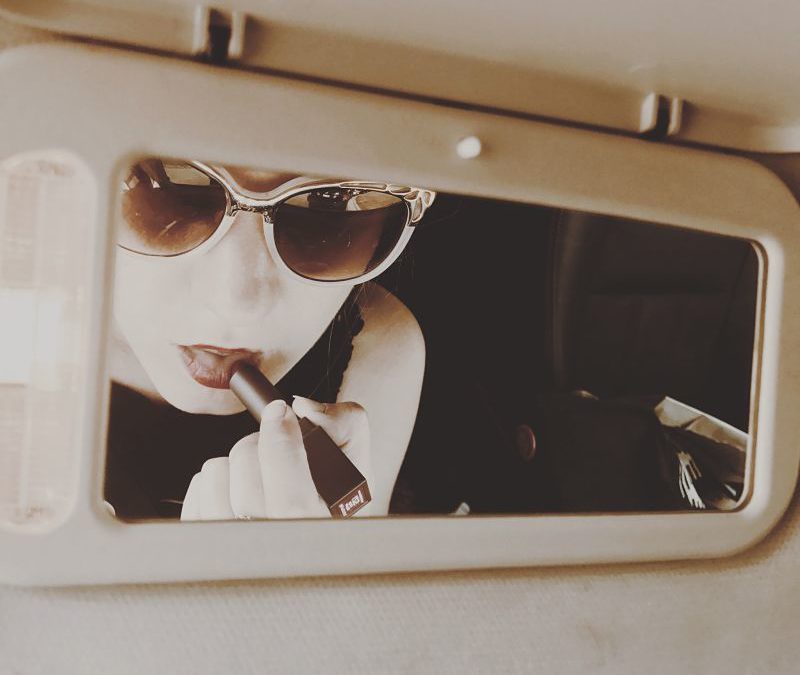After I came home from the “death session” (the cystoscopy which diagnosed Interstitial Cystitis), I found myself in a new predicament: I felt foreign; like an alien in my own skin.
My thoughts were broadcasting in German, or Russian, or some sort of combination of the two. I wasn’t sure what was happening. I wasn’t sure what I could eat anymore. I wasn’t sure what I could do anymore.
I simply wasn’t sure who I was.
When someone asked if I liked chocolate, should I say yes, because I did, or should I say no because now I couldn’t have it? I mean if you don’t know how to say yes to chocolate, seriously why keep going? It was rough.
A side note: I eat chocolate almost every night. One little square of dark chocolate. It’s divine.
(So to everyone who is searching the forums and finding themselves in a labyrinth of fear, and believing there is no hope for anything delicious ever again: forums are often terrible and the people in them are, believe it or not, sometimes wrong. Just because someone with your disease can’t do something doesn’t mean your future is the same. They’re there because they are struggling. Many more have gotten better. Don’t let their darkness become your own. Give them a virtual hug and then move on.)
Identity is defined as: “who someone is: the name of a person: qualities, beliefs, etc., that make a particular person or group different from others.” 1
After diagnosis, I think a lot of us wonder about our qualities and beliefs. What if everything we loved is something we can’t do anymore? Are we still ourselves?
For example, I like to write. When I write, I like to drink coffee. If I can’t drink coffee, am I less of a writer? Or what if my disease affected my ability to type or hold a pen? Would I still be a writer? Do you see how disease can muddle this?
As I hobbled through psychologically and emotionally from 2015 to 2016, I learned my own struggles were not exactly my own. Apparently I wasn’t the first person to have a chronic illness. Even more astonishing to the self-centered person I had become, due to all the pain and self loathing, I wasn’t the first person to look into why I felt the way I did.
Sociology researcher, Kathy Charmaz, wrote a paper on chronic illness and what it does to those who learn they have one. 2 She says the beginning of a chronic disease attacks not only our physical self but also our sense of identity making us doubt our self-worth. [click to tweet]
Does this sound like anything I have been rattling on about for the past few paragraphs? It should.
I wasn’t sure who I was.
Maybe you’re not sure who you are. Maybe disease even stole your name. You’re no longer <INSERT NAME HERE>. You’re the girl or guy with disease. You’re this shadow person and you’re lost inside of the grey. [click to tweet]
You’re in a state of identity limbo. It’s ok. I’m going to give you three tips on how to reintroduce yourself to, well, you.
1. Take Your Time
You have to give yourself time to let go of who you were before, and really truly grieve him/her. When a loved one dies, we know our grief is going to take a significant amount of time. It’s important we also allow ourselves this time to grieve the loss of our former self.
I am a person who likes immediate results. It’s why I love things like Amazon Prime, instant downloads, and mobile banking. It’s also why I hate working out. I do one set of arm reps and I am somehow surprised when I don’t see a bulging bicep in the mirror.
But, my friends, recovering from disease takes time. Start with this though: take time every day to reconnect to what moves you. I’ve written about it a hundred times, but it’s important, so I’ll say it again.
2. reinvest
How do you make a stranger your best friend? You have to spend time with them. Why shouldn’t this also apply to yourself? You are still you. Believe you will get back to you, and please don’t give up.
I’m still imperfect. I haven’t mastered it all, but I know who I am now beyond loving chocolate and I am actually thankful to IC for teaching me this lesson.
I’m also exceptionally angry my illness took some things I won’t ever get back, but I had to grieve those things to get back to being me without them.
3. Take Action
Grief and reinvesting in yourself may take time, but it doesn’t mean you can’t take action today.
Grab a notebook, or a friend, and list all the things your illness has changed. Everything from the way you dress to the things you eat. Write them all down. Seriously. Do it.
Then, cross out the things which really never defined you in the first place. When IC hit, I was told I could no longer drink orange juice. This was a bummer, particularly when you go to the restaurants which display their fresh OJ squeezers, but this did not make or break me as a person. Crossing it out was easy.
Next, I want you to identify the things which will sting; the things which came to mind to anyone who knew you before as “you”. Maybe it was some sort of physical activity. Maybe it was something as small as drinking coffee or as large as walking, but whether it appears minuscule or monumental to others, it means something to you, and it’s breaking your heart that you have to say good-bye.
Mourn the loss. This will not be something you do only in this exercise. You will likely mourn for a very long time. As you do, give yourself the permission to be upset and to be angry. This is hard. This is not what you asked for, and this is not fair. Mourn it.
Finally, pull out a fresh piece of paper. Think of your character; your personality. Who are you underneath the food, the career, the roles, and the extra-curriculars? Being the “gym guy” may have been cool, and you were inspiring, and you got a ridiculous amount of likes on Instagram, but I bet there’s something about you which the sexiest eight pack and rope flinging cross fit videos could never touch.
Maybe there is something you will learn to love. Maybe there is something you’ve always wanted to try, but never have, and it’s actually something you can do with this stupid disease. Try it.
It’s time to list all the possibilities your future holds. This is not the end of you. It’s just the end of the old you and the beginning of the new. Be brave. Be bold. Take your time grieving, reinvest, and then take action, because if you do, I can’t wait to meet the person you become. [Click to Tweet]
If you’ve enjoyed this post, be sure to subscribe and you’ll receive a free ebook all about kicking chronic disease in its big fat arse. Thanks for reading!
1. Identity [Def.1]. Merriam-Webster Online. In Merriam-Webster. Retrieved January 19, 2017, from http://www.merriam-webster.com/dictionary/identity.
2. Charmaz, K. (1983). Loss of self: a fundamental form of suffering in the chronically ill. Sociology of Health and Illness, 5, (2).


Keep working ,impressive job!
Thank-you so so much, Madelene!! I really appreciate the feedback!
I’m really enjoying the design and layout of your blog. It’s a very easy on the eyes which makes it much more enjoyable for me to come here and visit more often. Did you hire out a designer to create your theme? Outstanding work!
Thanks so much! I use Elegant Theme’s: Extra Layout. I changed some of the accent colors but I loved all the white space the theme provided. I had some help from a friend getting WordPress set up, but I haven’t used a designer. I really appreciate the compliment!
I hope you all are having a great weekend. I added a new list. This one is smaller, but still useful. I think the next one will be bigger.
I discovered your blog website on google and examine a number of of your early posts. Proceed to maintain up the excellent operate. I just additional up your RSS feed to my MSN Information Reader. Looking for forward to reading more from you afterward!…
Do you have any video of that? I’d love to find out some additional information.
No, but there’s always Google 🙂
Thank you for writing this awesome article. I’m a long time reader but I’ve never been compelled to leave a comment. I subscribed to your blog and shared this on my Facebook. Thanks again for a great post!
I’m so happy to hear that! Thanks for sharing!
Thanks for writing this awesome article. I’m a long time reader but I’ve never been compelled to leave a comment. I subscribed to your blog and shared this on my Twitter. Thanks again for a great article!
Awesome! Thanks so much!
Hello there! I could have sworn I’ve been to this
website before but after looking at a few of the articles I
realized it’s new to me. Anyhow, I’m definitely pleased I discovered it and I’ll be bookmarking it andd checking back frequently!
Thanks very interesting blog!
Thank you for posting this awesome article. I’m a long time reader but I’ve never been compelled to leave a comment. I subscribed to your blog and shared this on my Facebook. Thanks again for a great article!
Your post on Identity Theft | River + Quill is awesome. I hope u can continue writing many lot post in the future. Long live riverandquill.com
haha! Thank-you!
Pretty! This was an extremely wonderful post.
Thank you for supplying these details.
I truly appreciate this blog.Really looking forward to read more. Want more.
Hey there! Do you use Twitter? I’d like to follow you iif that would be ok.
I’m absolutely enjoying your blog and lookk forward to new updates.
Hi! Yep – I am @CallieDixon on there. Also, if you scroll down to the bottom of this page, you’ll find some social media buttons in black and white. You can find me on any of my social media platforms by clicking the one you want 🙂 Hope to see you over there!
Hmmm it looks like your blog ate my first comment (it was super long) soo I guess I’ll just sum it upp what I wrote and say, I’m thoroughly enjoying your blog.
I too am an aspiring blog writer but I’m still new to everything.
Do youu havbe any oints for inexperienced blog writers?
I’d genuinely appreciate it.
Excellent post! We are linking to this great post on our site. Keep up the good writing.
This post is invaluable. Where can I find out more?
I went over this site and I conceive you have a lot of wonderful info , saved to bookmarks (:.
Awesome!
Hi, just wanted to tell you, I loved this article.
It was practical. Keep on posting!
With thanks! Valuable information!
Thankyou for your wonderful blog!
Thanks so much!
My spouse and I absolutely lofe your blpg and find nearly all
of your post’s to bbe exactly I’m looking for. can you offer
guest writers to write content for you? I wouldn’t mind writing a post or
elaborating on most of the subjects you write
in relation to here. Again, awesome web log!
Thanks! I am writing all my content at this point, but you can check back in the future 🙂
Thank you for your post.Thanks Again. Really Cool.